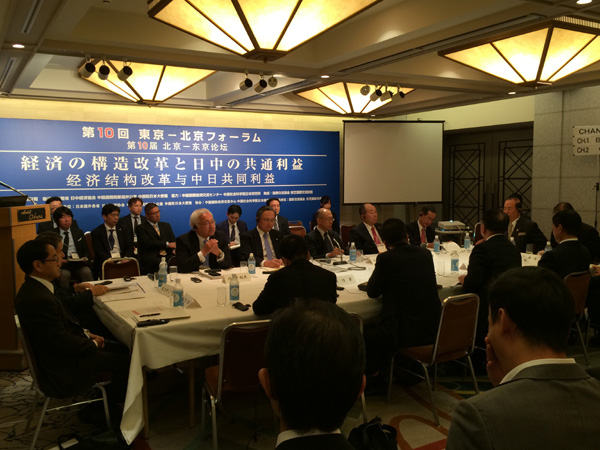 |
|
Participants debate at an economic panel discussion of the 10th Beijing-Tokyo Forum, a conference co-hosted by China Daily and the Japanese nonprofit think tank Genron NPO, to share interrelated issues on Sunday in Tokyo, Japan. [Liu Zheng/chinadaily.com.cn] |
Putting aside political disputes, the total trade volume of Sino-Japan has witnessed a hard-won raise in H1. People are keen to ask: What is the future of economic cooperation between the two countries?
Experts from both sides are gathered under one roof at the economic panel discussion of the 10th Beijing-Tokyo Forum.
In terms of macro-economy, according to Wei Jianguo, secretary-general of the China Center for International Economic Exchanges, the two countries' bilateral economic cooperation will be able to keep complementarity in the upcoming 10-15 years. However, they will become competitors after that period in the business area.
"During the 10-15 years, comparing with capital investment or bilateral trade, such complementarity will transform to the sectors, including finance, service, e-commerce and regional cooperation," Wei said.
"The golden age of Sino-Japan economic cooperation is near," said Zhang Yansheng, secretary-general of the Academic Committee of the National Development and Reform Commission.
According to Zhang, a high value-added economic cooperation is the next step for the two countries.
"By following the canon of economics, respecting the law of nature and complying with the rules of communities, the ongoing and future development theory for China includes innovation, structural reforms, environmental protection and further opening-up," Zhang said.
"Balancing the relationship between natural resources and human beings has become a very important issue during China's further development… Japan's experience has set China a good example," Zhang added.
It seems that the yen's sharp depreciation after the implementation of "Abenomics", referring to Prime Minister Shinzo Abe's economic policies, has received both praise and blame in Japan.
"Recently, the exchange rate of Japanese yen to US dollars increased five percent within one week, from $1 equals 102 yen, to $1 equals 109. Such a slump has a big influence on small- and middle-sized enterprises and families in Japan," said Zhang Jifeng, assistant to the director of the Institute of Japanese Studies at the Chinese Academy of Social Sciences.
According to Zhang, China and Japan should cooperate with each other to avoid foreign currency risk. Back in 2012, before Japanese Prime Minister Shinzo Abe paid a visit to the Yasukuni shrine in Tokyo, which honors convicted war criminals from World War II, the Sino-Japan bilateral cooperation in finance and banking sectors had made some improvements.
"The direct transaction between Japanese yen and Chinese yuan should be expanded… If 90 percent of the foreign trade between the two sides can be balanced with yuan or yen, that means one fifth of Japan’s foreign trade volume will not be affected by US dollars," Zhang added.
The total trade volume of the two countries rose by 4.4 percent to $168.4 billion in the first half of 2014, in contrast to the double-digit decrease in the same period last year, according to a report by the Japan External Trade Organization in August.
China's outbound tourism consumption, purchasing power of luxuries and even the import quantum of foreign movies have hit a new high in 2014.
"The government and enterprises of Japan should have realized that China has gradually transformed from a manufacturing giant to a country with consumptive demand," said Liang Xinjun, Vice Chairman and CEO of Fosun Group.
